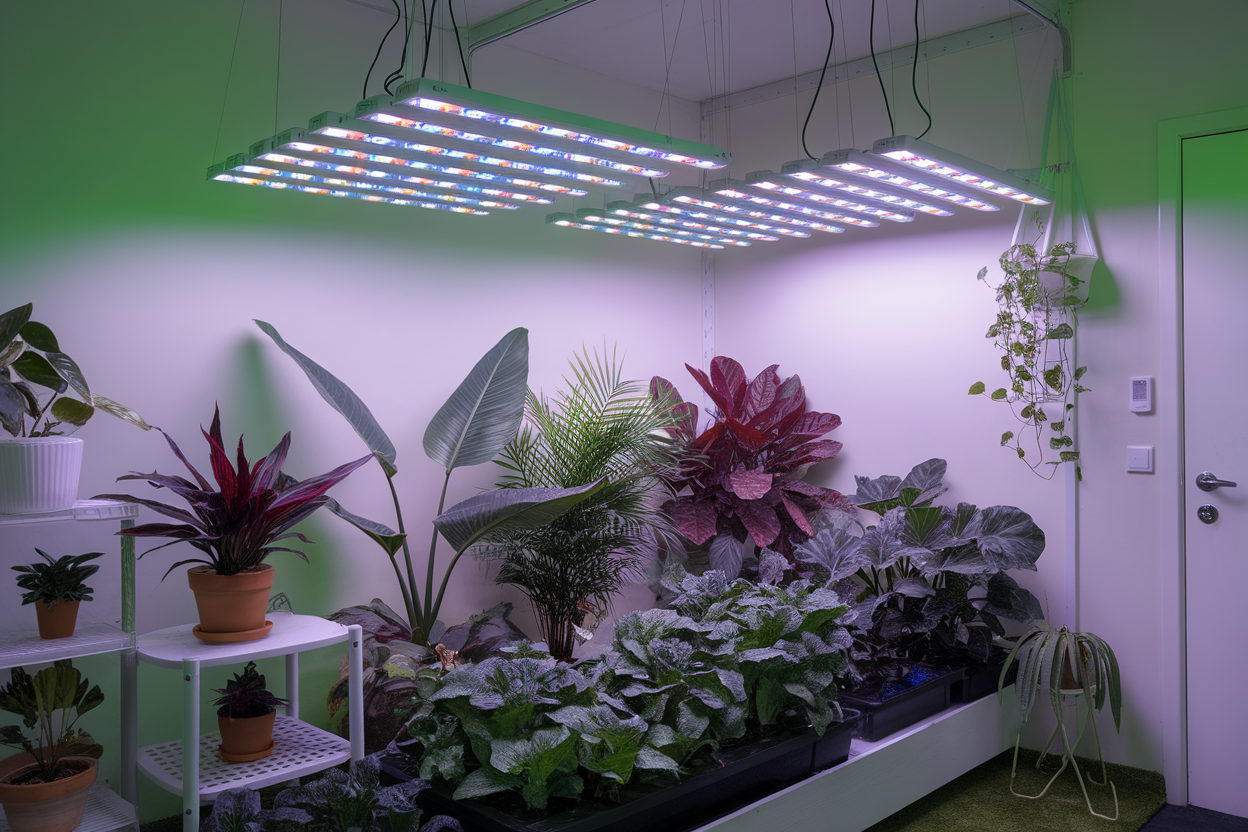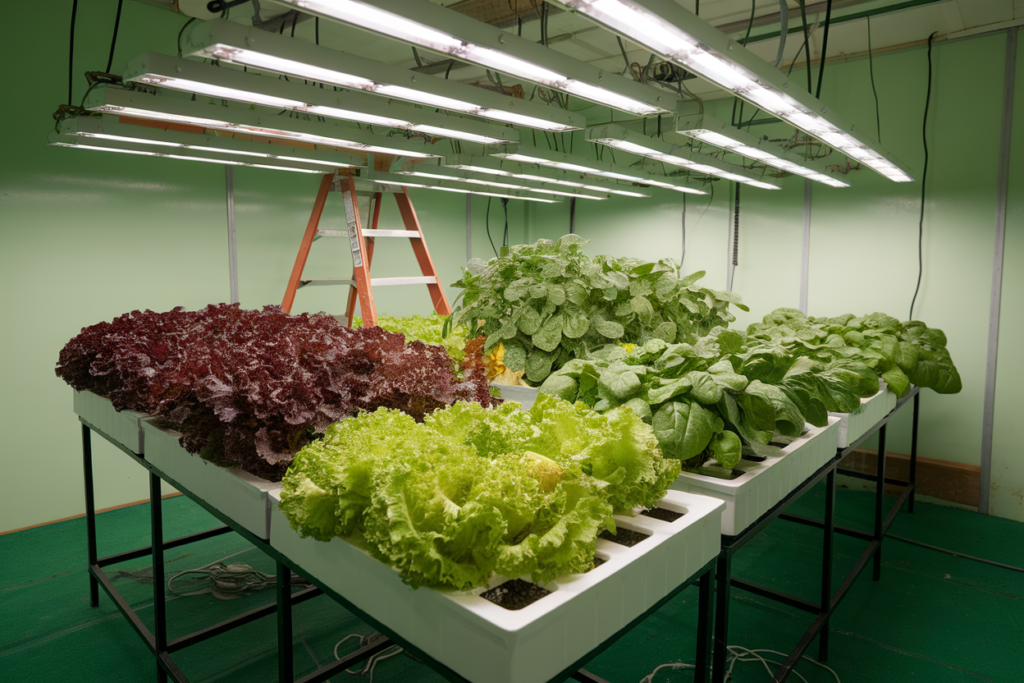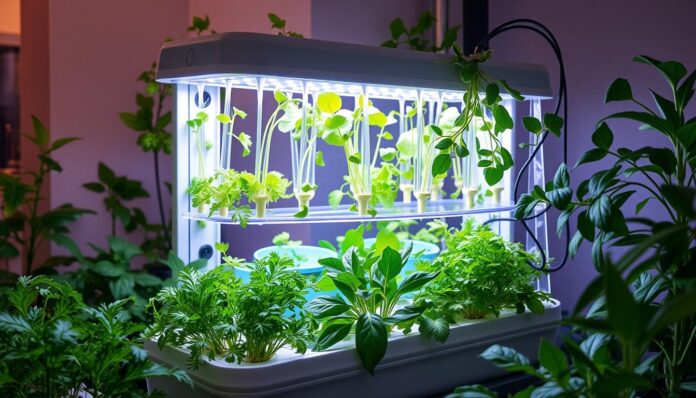Hydroponic gardening is a new and exciting way to grow plants indoors without soil. It lets gardeners grow veggies, herbs, and fruits in small spaces. This method uses special hydroponic systems.
Starting a hydroponic garden is exciting. It turns your home into a green, growing space. With some basic knowledge, you can grow healthy plants all year round.
To succeed in hydroponics, you need a good plan, the right tools, and a willingness to learn. I will help you start your hydroponic garden. You can grow herbs for cooking or create a sustainable food source.
Hydroponic gardening has many benefits. Plants grow faster, water is saved, and you can grow in tight spaces. With the right tools and knowledge, your indoor garden can thrive.
Understanding Hydroponic Growing Systems
Hydroponic methods let gardeners grow plants without soil. They control plant nutrition and environment precisely. Each system has its own benefits for home gardeners and farmers.
Exploring water culture techniques helps beginners choose the right method. Each system has unique features for different plants and environments.
Deep Water Culture Systems
DWC systems are simple. Plants’ roots hang in nutrient-rich water. An air stone pumps oxygen, giving roots nutrients and air. It’s great for fast-growing greens and herbs.
Nutrient Film Technique
NFT hydroponics has a thin nutrient solution flow over roots. Shallow channels help roots get water and minerals. It’s best for small plants with short growth cycles.
Wick Systems for Beginners
Wick systems are easy for beginners. Nutrients move from a reservoir to roots through cotton rope. They’re perfect for small herbs and compact veggies.
“Hydroponics transforms traditional gardening by replacing soil with intelligent water-based growing solutions.” – Urban Farming Institute
Essential Equipment and Supplies for Your First Hydroponic Garden

Starting a hydroponic garden needs specific supplies for a great growing space. Beginners must get the right equipment for growing plants well.
Grow lights are key for indoor gardens. LED or full-spectrum lights give plants the light they need. Choose lights that can adjust intensity and cover your garden’s size.
Air pumps are vital for getting oxygen to plant roots. They keep nutrient solutions moving and prevent roots from getting too wet. Pick air pumps that fit your garden’s design for healthy roots.
Nutrient solutions are crucial for your garden’s health. They have the minerals and compounds plants need to grow strong. Find solutions made for different growth stages.
pH testing kits are important for keeping nutrient solution acidity right. The right pH lets plants absorb nutrients well. Digital pH meters give quick and accurate readings for better management.
Choosing the right growing medium is key for root support and water hold. Options like rockwool, clay pellets, and coconut coir have different benefits. Pick a medium that fits your plants’ needs.
Best Plants for Hydroponic Garden for Beginners
Starting a hydroponic garden is exciting. It lets you grow fresh produce at home. Picking the right plants makes your first try fun and successful.
Beginner-friendly plants help new gardeners feel confident. They learn important skills in hydroponics. Some plants grow well in hydroponics and give quick harvests.
Leafy Greens for Hydroponics
Lettuce and spinach are great for hydroponics. They grow fast, need little care, and do well in most setups. Lettuce is ready to harvest in 4-6 weeks, perfect for beginners.
Easy-to-Grow Herbs
Herbs like basil and mint are perfect for hydroponics. They grow fast, need little space, and add fresh flavors to food. Basil does well in water and can be picked many times.
Simple Fruiting Plants
Tomatoes and peppers are a fun challenge for hydroponic gardeners. They need more care but can be grown by beginners. Cherry tomatoes and small pepper varieties are best for small systems.
Maintaining Optimal Growing Conditions
Successful hydroponic gardening needs precise environmental conditions. It’s key to watch pH levels for plant health and nutrient absorption. Most plants do best with a pH between 5.5 and 6.5. This range helps them absorb nutrients well and avoid deficiencies.
Water temperature is also vital for plant growth. Plants grow best in temperatures between 65-75°F. This ensures roots get enough oxygen and nutrients. Keeping water temperature steady helps plants grow healthy and strong.
Setting up a good lighting schedule is crucial for photosynthesis and growth. Most veggies need 14-16 hours of light each day. LED grow lights are a great choice for efficient lighting.
Keeping pests away in hydroponics requires early action. Check plants often for pests, use beneficial insects, and keep the area clean. A balanced nutrient diet also helps plants fight off pests.
Regular maintenance is important for hydroponic gardens. Check system parts, clean reservoirs, and watch plant health. Having a routine helps catch problems early and keeps your garden productive and healthy.
Final Thoughts
Starting a hydroponic garden opens up a world of possibilities for home gardeners. These systems are water-efficient and let you grow food all year. You can turn small spaces into green havens with fresh veggies and herbs.
Hydroponic gardening has many benefits over traditional gardening. It’s perfect for city living and small spaces. You get healthier plants and more consistent harvests because of the controlled growing conditions.
For beginners, hydroponic gardening is a fun learning journey. Each system has its own challenges and rewards. With time and practice, you’ll learn a lot about growing food and living sustainably.
Embrace hydroponic gardening as a way to live more sustainably. It’s great for growing leafy greens, herbs, and small fruits. Hydroponic systems make it easy to produce your own food and connect with your food sources.











